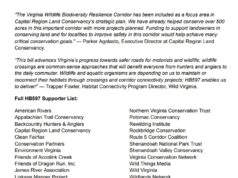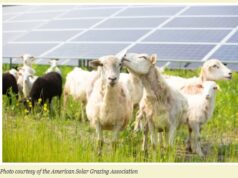by Ivy Main, cross-posted from Power for the People VA
Virginia is, famously, a state that prides itself on being business-friendly. That makes it all the more interesting that a number of bills favoring consumers have made it through the House. Democrats have led the charge, but several of the bills earned bipartisan support even in the face of utility opposition.
This doesn’t guarantee their luck will hold. Democrats aren’t just more numerous in the House, they are also younger and more independent-minded than the old guard Democrats in control of the Senate. The second half of the session is going to be a lot more challenging for pro-consumer legislation.
The action will be especially hot in the coming days around five bills dealing with utility reform and a customer’s “right to shop” for renewable energy (HB2048). All these bills passed the House with at least some Republican support. But they are headed to Senate Commerce and Labor, which, though dominated by Democrats, has a long history of protecting utilities.
The Clean Car Standard (HB1965), which would make electric cars more readily available in Virginia, and the EV rebate bill (HB1979), which would make them more affordable, seem to be on stronger ground as far as Democratic support goes — and they will need all the Democrats because Republicans are united in opposition. But rebates require money, and that is always a challenge.
Below is the status of the bills I’ve been following. Since we have passed “crossover,” House bills will be heard in the Senate and vice-versa. At the end I’ve collected the bills that died along the way.
BILLS ALIVE AT HALFTIME
Bills are arranged by category, and then by number, with House bills first.

Renewable energy and storage
• HB1925 (Kilgore) establishes, but does not fund, the Virginia Brownfield and Coal Mine Renewable Energy Grant Fund and Program. Passed the House unanimously, expected to pass in the Senate.
• HB1994 (Murphy) and HB2215 (Runion) expands the definition of small agriculture generators to include certain small manufacturing businesses such as breweries, distilleries and wineries for the purposes of the law allowing these businesses to aggregate meters and sell renewable energy to a utility. HB2215 was incorporated into HB1994, which passed the House 93-6. I expect it to pass the Senate.
• HB2006 (Heretick) and SB1201 (Petersen) change the definition of an “electric supplier” to include the operator of a storage facility of at least 25 MW, exempting them from state and local taxation but allowing a revenue share assessment. This is a priority bill for renewable energy industry associations. HB2006 passed the House 11-8 with one abstention. SB1201 passed the Senate 38-0-1. Looks like this one is a done deal.
• HB2034 (Hurst) clarifies that the program allowing third-party power purchase agreements (PPAs) applies to nonjurisdictional customers (i.e., local government and schools) as well as jurisdictional customers (most other customers). Passed the House 99-0. Senate companion bill SB1420(Edwards) also passed unanimously, so this is another done deal.
• HB2048 (Bourne) restores the right of customers to buy renewable energy from any supplier even once their own utility offers a renewable energy purchase option. In addition, third party suppliers of renewable energy are required to offer a discounted renewable energy product to low-income customers, saving them at least 10% off the cost of regular utility service. Passed the House 67-32, which is darned good for a pro-consumer, pro renewable energy bill. But a similar bill ran into trouble in Senate Commerce and Labor in past years due to utility opposition.
• HB2148 (Willett) provides for energy storage facilities below 150 MW to be subject to the DEQ permit by rule process as “small renewable energy projects.” This is a priority bill for renewable energy industry associations. Passed the House 89-9.
• HB2201 (Jones) and SB1207 (Barker) expands provisions related to siting agreements for solar projects located in an opportunity zone to include energy storage projects; however, according to existing language, the provision only takes effect if the GA also passes legislation authorizing localities to adopt an ordinance providing for the tax treatment of energy storage projects. (Why doesn’t the bill just go ahead and include that authorization? Don’t ask me.) This is another renewable energy industry bill. HB2201 passed the House 71-29. SB1207 passed the Senate 37-0. Another done deal.
• HB2269 (Heretick) provides for increases in the revenue share localities can require for solar projects based on changes in the Consumer Price Index. Passed the House 91-8.
• SB1258 (Marsden) requires the State Water Control Board to administer a Virginia Erosion and Sediment Control Program (VESCP) on behalf of any locality that notifies the Department of Environmental Quality that it has chosen not to administer a VESCP for any solar photovoltaic (electric energy) project with a rated electrical generation capacity exceeding five megawatts. The provisions become effective only if the program is funded; Marsden has submitted a budget amendment. This is also a priority bill for renewable energy industry associations. Passed the Senate 39-0.
• SB1295 (DeSteph) requires utilities to use Virginia-made or U.S.-made products in constructing renewable energy and storage facilities “if available.” After much criticism it was amended to read that the products must be “reasonably available and competitively priced,” after which the now-happily-pointless bill passed the Senate 37-0-2.

Energy efficiency and buildings
• HB1811 (Helmer) adds a preference for energy efficient products in public procurement. Passed the House 55-44 along party lines. Someone will have to explain to me why wasting taxpayer dollars on products that cost more to operate is a conservative value.
• HB1859 (Guy) amends last year’s legislation on Commercial Property Assessed Clean Energy (C-PACE) loans to allow these loans to be extended to projects completed in the previous two years; it also expressly excludes residential buildings of less than five units and residential condominiums. Passed House 61-38; passed Senate 26-12-1. A done deal.
• HB2001 (Helmer) requires state and local government buildings to be constructed or renovated to include electric vehicle charging infrastructure and the capability of tracking energy efficiency and carbon emissions. Local governments are authorized to adopt even more stringent requirements. Passed the House 53-45.
• HB2227 (Kory) and SB1224 (Boysko) originally required the Board of Housing and Community Development to adopt amendments to the Uniform Statewide Building Code within one year of publication of a new version of the International Code Council’s International Energy Conservation Code (IECC) to address changes related to energy efficiency and conservation. The bill would have required the Board to adopt Building Code standards that are at least as stringent as those contained in the new version of the IECC. It turns out the homebuilders who oppose higher efficiency standards have more clout with committee chairs David Bulova in the House and George Barker in the Senate than consumer and environmental advocates do. The Senate bill never even got a hearing in committee. After much negotiation, the amended House bill now merely requires the Housing Board to “consider” adopting amendments “at least as stringent as those contained” in the latest IECC, and must “assess the public health, safety, and welfare benefits” involved, “including potential energy savings and air quality benefits over time compared to the cost of initial construction.” Republicans still wouldn’t vote for it, so it passed the House only on a party-line vote of 55-45.
Financing
• HB1919 (Kory) authorizes a locality to establish a green bank to finance clean energy investments. Fairfax County has requested this authority. Passed the House 55-43 on another party-line vote.
Fossil fuels
• HB1834 (Subramanyam) and SB1247 (Deeds) originally required owners of carbon-emitting power plants to conduct a study at least every 18 months to determine whether the facility should be retired; and to give notice of any decision to retire a facility to state and local leaders within 14 days. Both bills were amended so that the retirement analysis is now just a part of the integrated resource planning process of investor-owned utilities, currently every three years, leaving out other plant owners like ODEC. The amended bills both passed their chambers unanimously.
• HB1899 (Hudson) and SB1252 (McPike) sunset the coal tax credits, because it is absolutely crazy that Virginia continues to subsidize coal mining. Amended to give the coal companies one more year of subsidies before the program ends Jan. 1, 2022. Passed the House 54-45 and Senate 22-17.
• SB1265 (Deeds) makes it easier for DEQ to inspect and issue stop-work orders during gas pipeline construction. An amendment slightly weakened the bill before it passed the Senate 38-0.
• SB1311 (McClellan) originally required DEQ to revise erosion and sediment control plans or stormwater management plans when a stop work order has been issued for violations related to pipeline construction. The bill has been amended significantly and the stop-work language removed. It does require pipeline applicants to submit detailed erosion and sediment control plans, and expands the applicability of the requirement to areas with slopes with a grade above 10 percent, a number that is currently 15 percent. Passed the Senate 20-17.

Climate bills
• HB2330 (Kory) is the legislation the SCC asked for to provide guidance on the Percentage of Income Payment Program under the Virginia Clean Economy Act. This turned out to be harder than one would have thought for a bill that was just supposed to help implement a section of a previous year’s bill, and it may still be subject to further changes. Passed the House 54-46, the usual party-line split.
• SB1282 (Morrissey) directs DEQ to conduct a statewide greenhouse gas inventory, to be updated and published every four years. Passed the Senate 22-16. (It picked up one Republican vote: Jill Vogel.)
• SB1284 (Favola) changes the name of the Commonwealth Energy Policy to the Commonwealth Clean Energy Policy, and streamlines the language without making major changes to the policies set out last year in Favola’s successful SB94. That bill overhauled the CEP, which until then had been a jumble of competing priorities, and established new targets for Virginia to achieve 100 percent carbon-free electricity by 2040 and net-zero carbon economy-wide by 2045. This year’s bill shows the Northam administration is now fully on board, and the result is a policy statement that is more concise and coherent. Amendments make the bill slightly more friendly to biomass and natural gas than the introduced bill had been, but it remains an improvement on existing law. Senator Norment, who opposed last year’s bill as well as this year’s, tried to run out the clock on it by getting it referred to Finance after it was reported from Commerce and Labor, but Finance promptly reported it, and it passed the Senate 21-18. It should have no trouble in the House.
• SB1374 (Lewis) would set up a Carbon Sequestration Task Force to consider methods of increasing carbon sequestration in the natural environment, establish benchmarks and identify carbon markets. Passed the Senate 38-0.

Utility reform
The House bills are doing great, but the one Senate bill (SB1292, see “Dead and buried”) went down in flames in Commerce and Labor with only three yea votes from Senators Deeds, Mason and Bell. The five House bills are now headed to that same tough committee. If any survive, it is likely to be the Hudson and/or Helmer bills, which are the least prescriptive. Judging from the comments made during the debate of the one Senate bill, I don’t see how the other three make it through the committee.
• HB1914 (Helmer) changes “shall” to “may” in a number of places, giving the SCC discretion over when to count utility costs against revenues. HB1835 (Subramanyam) was incorporated into this bill. Passed the House 60-39.
• HB1984 (Hudson) gives the SCC added discretion to determine a utility’s fair rate of return and to order rate increases or decreases accordingly. Passed the House 64-35.
• HB2049 (Bourne) would prevent utilities from using overearnings for new projects instead of issuing refunds. Passed the House 56-44.
• HB2160 (Tran) gives the SCC greater authority to determine when a utility has overearned and gives the Commission greater discretion in determining whether to raise or lower rates and order refunds. It also requires 100 percent of overearnings to be credited to customers’ bills, instead of 70 percent, as is the case today. Passed the House 62-38.
• HB2200 (Jones) makes a number of changes to SCC rate review proceedings, including setting a fair rate of return, requiring 100 percent of overearnings to be credited to customers’ bills, and eliminating the $50 million limit on refunds to Dominion customers in the next rate review proceeding. HB2057 (Ware) was incorporated into this bill, and it passed the House 63-37.

EVs and transportation energy
• HB1850 (Reid) increases the roadway weight limit for electric and natural gas-fueled trucks to accommodate the extra weight of batteries or natural gas fuel systems. Passed the House 98-0.
• HB1965 (Bagby) is the Clean Car Standard bill, which would require manufacturers to deliver more electric vehicles to Virginia dealers beginning in 2025. To get agreement from the dealers, this bill has been “packaged” with HB1979 (rebates for EVs), which dealers wanted to ensure the customers would be there. Republicans still don’t like it. Passed the House 55-44.
• HB1979 (Reid) creates a rebate program for new and used electric vehicles. Passed the House 55-45.
• HB2118 (Keam) establishes an Electric Vehicle Grant Fund and Program to assist school boards in replacing diesel buses with electric, installing charging infrastructure, and developing workforce education to support the electric buses. It seems to be an empty fund. Passed the House 55-44-1.
• HB2282 (Sullivan) directs the SCC to develop and report on policy proposals to accelerate transportation electrification in the Commonwealth. The bill also limits how utilities get reimbursed for investments in transportation electrification: they must recover costs through normal rates for generation and distribution, and not through rate adjustment clauses or customer credit reinvestment offsets. Passed the House 76-23.
• HJ542 (McQuinn) requests a statewide study of transit equity and modernization. Passed the House 77-19.
• SB1223 (Boysko) adds a requirement to the Virginia Energy Plan to include an analysis of electric vehicle charging infrastructure and other infrastructure needed to support the 2045 net-zero carbon target in the transportation sector. Passed the Senate 22-15.
• SB1380 (Lucas) authorizes electric utilities to partner with school districts on electric school buses. The utility can own the batteries and the charging infrastructure and use the batteries for grid services and peak shaving. Passed the Senate 33-4.
Code update
• SB1453 (Edwards) revises Titles 45.1 and 67 of the Virginia Code. “The bill organizes the laws in a more logical manner, removes obsolete and duplicative provisions, and improves the structure and clarity of statutes pertaining to” mining and energy. The bill is a recommendation of the Virginia Code Commission. Passed the House 39-0.

DEAD AND BURIED
In numerical order, House bills first
• HB1934 (Simon) requires local approval for construction of any gas pipeline over 12 inches in diameter in a residential subdivision. Killed in committee.
• HB1937 (Rasoul) was this year’s version of the Green New Deal Act. But like last year, it never even got a hearing, in part because it rocked too many boats, and in part because it was a lousy bill.
• HB2067 (Webert) lowers from 150 MW to 50 MW the maximum size of a solar facility that can use the Permit by Rule process. Tabled in committee.
• HB2265 (Freitas) would repeal provisions of the VCEA phasing out carbon emissions from power plants, repeal the restrictions on SCC approval of new carbon-emitting facilities, and nix the provisions declaring wind, solar, offshore wind and energy storage to be in the public interest; however it also would declare that planning and development of new nuclear generation is in the public interest. Killed in subcommittee.
• HB2281 (Ware) would exempt certain companies that use a lot of energy from paying for their share of the costs of Virginia’s energy transition under the VCEA, driving up costs for all other ratepayers. Killed in subcommittee.
• HB2292 (Cole) was labeled the fossil fuel moratorium bill but included many other parts of the Green New Deal as well. It suffered the same fate, and for the same reasons.
• SB1292 (McClellan) was the only utility reform bill to begin in the Senate instead of the friendlier House. It would require 100% of utility overearnings to be credited to customers’ bills, instead of 70 percent, as is the case today. Killed in committee.
• SB1463 (Cosgrove) would create a loophole to let HOAs to ban solar once again. It turned out even the HOA lobby didn’t like the bill. It was stricken by the patron in committee.
This post was originally published in the Virginia Mercury on February 8, 2021.


![Video: Ivy Main Says “the hostility to offshore wind is really just [Trump]; nobody else feels this way…he will be gone and then we will get back on track”](https://bluevirginia.us/wp-content/uploads/2026/02/axiosivymain-238x178.jpg)









![Saturday News: “Ukraine is the biggest and most consequential of all the American betrayals”; “Get Ready for Zombie Tariffs”; Murdoch’s WSJ – “Trump Demeans Himself as He Attacks the Supreme Court”; “Virginia House Delays Action on Bill Banning [Lethal Pesticide] Paraquat”](https://bluevirginia.us/wp-content/uploads/2026/02/montage0221-100x75.jpg)